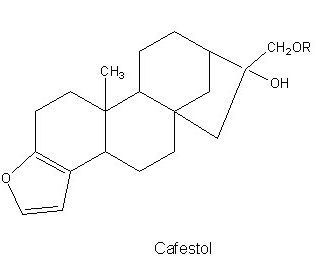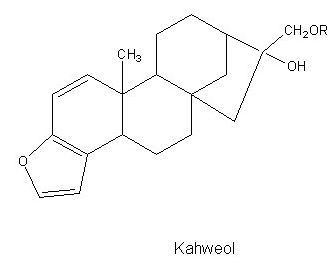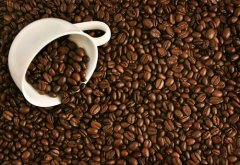Caffeine alcohol in boutique coffee
In the 1980s, it was found that consumption of unfiltered coffee raised serum cholesterol levels, a result caused by the caffeine and caffeinol in coffee.
Coffee beans can be separated into coffeeol and coffeeol, which are fat-soluble substances of diterpenes. The only difference between them is the addition of a double bond to the caffeine.


The concentrations of these two substances vary according to coffee variety, Arabica coffee beans contain caffeine and caffeine, while Robusta coffee beans contain half of caffeine and almost no caffeine. These two substances can make up as much as 1% of Arabica beans.
Coffeohol was more effective at raising serum cholesterol than caffeeohol, and the mixture of caffeeohol ( 60 mg/day) and caffeeohol ( 51 mg/day) was only slightly better at raising serum cholesterol than pure caffeeohol ( 64 mg/day). Due to the difficulty of purification and the poor stability of this diterpene, the effect of pure caffeinol on serum cholesterol is unknown.
Both substances can be extracted with hot water but remain on filter paper. This explains why Northern European boiled coffee, Turkish coffee and French compressed coffee contain relatively high amounts of caffeine and coffeesol ( 6-12 mg/cup), while filtered coffee and instant coffee contain low amounts of caffeine and coffeesol ( 0.2-0.6 mg/cup). Although diterpenes are relatively high in steam-brewed espresso coffee, they are only a minor source of caffeine ( 4 mg/cup) due to the small amounts consumed.
Important Notice :
前街咖啡 FrontStreet Coffee has moved to new addredd:
FrontStreet Coffee Address: 315,Donghua East Road,GuangZhou
Tel:020 38364473
- Prev

Selection of Coffee Grinder, the key to Fine Coffee
The grinder is more important than the coffee machine, and players recommend a sawtooth grinder because it can grind uniform coffee powder quickly and steadily. When you choose to buy a grinder, you should pay attention to its power, usually between 70 watts and 150 watts, the higher the better, the higher the power, the faster the grinding speed, and the shorter time the coffee powder stays in the sawtooth, so it can grind coffee with low temperature.
- Next

Teach you to judge a good Espresso
People like to drink coffee because it releases flavor and aroma when it is brewed. The sources of flavor in coffee are mostly water-soluble, such as caffeine, protein, sugar and so on, while the sources of aroma are mostly insoluble, such as coffee oil. The volatile aroma of coffee oil is found in roasted coffee cells. Some of these oils are insoluble in water and are only used on Espresso machines.
Related
- Beginners will see the "Coffee pull flower" guide!
- What is the difference between ice blog purified milk and ordinary milk coffee?
- Why is the Philippines the largest producer of crops in Liberia?
- For coffee extraction, should the fine powder be retained?
- How does extracted espresso fill pressed powder? How much strength does it take to press the powder?
- How to make jasmine cold extract coffee? Is the jasmine + latte good?
- Will this little toy really make the coffee taste better? How does Lily Drip affect coffee extraction?
- Will the action of slapping the filter cup also affect coffee extraction?
- What's the difference between powder-to-water ratio and powder-to-liquid ratio?
- What is the Ethiopian local species? What does it have to do with Heirloom native species?

